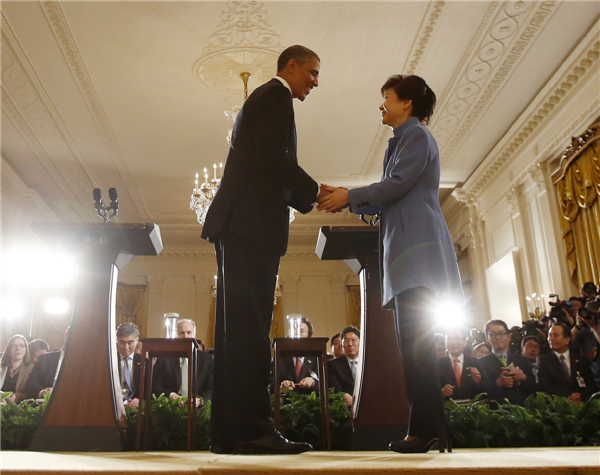Washington reaffirms defense of ROK
Updated: 2013-05-09 07:46
By Zhou Wa in Beijing and Chen Weihua in Washington (China Daily)
|
|||||||||
 |
|
US President Barack Obama shakes hands with the Republic of Korea's President Park Geun-hye at the end of their joint news conference in the East Room of the White House. [Photo/Agencies] |
Washington on Tuesday reiterated its defense commitment to Seoul with both conventional and nuclear forces, vowing no concessions to the Democratic People's Republic of Korea after months of high tensions.
Observers said both the United States and the Republic of Korea have strategic and security concerns to strengthen their alliance, but it would not have a large influence over the situation on the Korean Peninsula.
US President Barack Obama and visiting ROK President Park Geun-hye reaffirmed their intolerance of Pyongyang's "threats and provocations" and emphasized the importance of continued strengthening of their deterrence against its nuclear and conventional weapons threat.
"If Pyongyang thought its recent threats would drive a wedge between South Korea and the US or somehow garner the North international respect, today is further evidence that North Korea has failed again," Obama said.
"The days when North Korea could create a crisis and elicit concessions - those days are over," Obama told reporters at a White House news conference with Park.
Obama said that he and Park agreed in talks that "we are not going to reward provocative behavior" but kept the door open to eventual talks if DPRK leader Kim Jong-un decides to embrace "a peaceful path".
Both Obama and Park called on the DPRK to take meaningful steps in return for engagement and assistance.
"Our two nations are prepared to engage with North Korea diplomatically and over time build trust," Obama said.
Meaningful steps
"But, as always, and as President Park has made clear, the burden is on Pyongyang to take meaningful steps to abide by its commitments and obligations, particularly the denuclearization of the Korean Peninsula."
Park, who is on her first foreign trip since taking office in February, said her administration will work with Washington to "induce North Korea to make the right choice through multifaceted efforts, including the implementation of the Korean Peninsula trust-building process" that she had spelled out.
ROK security largely depends on the US-ROK alliance, said Wang Junsheng, a researcher on East Asian studies with the Chinese Academy of Social Sciences.
"Since the tensions on the Korean Peninsula increased earlier this year, more and more ROK residents and officials called for strengthening the US-ROK alliance," he said.
The US defense commitment and nuclear umbrella is very important to Seoul, said Tao Wenzhao, a researcher on American studies with the Chinese Academy of Social Sciences.
Tao said the US-ROK alliance in the East Asia region is also very important to the US, which will continue its Asia-rebalancing strategy, because "both security threats and opportunities for economic growth are located in this region".

 Michelle lays roses at site along Berlin Wall
Michelle lays roses at site along Berlin Wall
 Historic space lecture in Tiangong-1 commences
Historic space lecture in Tiangong-1 commences
 'Sopranos' Star James Gandolfini dead at 51
'Sopranos' Star James Gandolfini dead at 51
 UN: Number of refugees hits 18-year high
UN: Number of refugees hits 18-year high
 Slide: Jet exercises from aircraft carrier
Slide: Jet exercises from aircraft carrier
 Talks establish fishery hotline
Talks establish fishery hotline
 Foreign buyers eye Chinese drones
Foreign buyers eye Chinese drones
 UN chief hails China's peacekeepers
UN chief hails China's peacekeepers
Most Viewed
Editor's Picks

|

|

|

|

|

|
Today's Top News
Shenzhou X astronaut gives lecture today
US told to reassess duties on Chinese paper
Chinese seek greater share of satellite market
Russia rejects Obama's nuke cut proposal
US immigration bill sees Senate breakthrough
Brazilian cities revoke fare hikes
Moody's warns on China's local govt debt
Air quality in major cities drops in May
US Weekly

|

|








